The seeds of this story were planted when two teachers embarked on a trek across Australia to explore the viability of alternate fuels, deliver training to remote indigenous communities and satisfy their desire for adventure.
The communities welcomed the pair and in some cases, through generosity, helped to keep the project on the road.
It has been said that it was in the evenings often sitting around a campfire that the locals shared their stories and friendships grew. Many conversations centred on growing up as a part of the stolen generation.
The story of Wyamba is based on a child from the stolen generation, who escapes custody from a mission during the settlement of a farming region in outback South Australia in the 1800’s.
A British group led by Edward Gibbon Wakefield aimed to set up a state, based on free settlement rather than convict labour. In 1836 Governor Hindmarsh proclaimed the state of South Australia.
The driest state on the driest continent in the world was to be settled by free settlers.
Adelaide was to be its capital and the port of Port Augusta the gateway to the north. The first few years of unusually high rainfall saw squatters move north and both agriculture and mining took route. The land was surveyed and a part of the northern region of the state was divided into what was to be known as the hundreds. In 1877 the South Australian government held its first Hundreds lottery. These blocks of land were then on sold to new settlers enabling the wealthy to gain a holding within South Australia. The rapid expansion saw a rail line built in 1878 north of Port Augusta to the settlement of Hawker and then in 1881 onto Beltana. Prior to the rail, the Afghan Camel Trains played an important part in transporting goods into the harsh outback resulting in a string of small towns throughout the area.
The land was settled as if the Aboriginal People didn’t exist; in fact, the first Aboriginal to gain citizenship was Albert Namindura in 1957. The Aboriginal People had different rights to European settlers and it wasn’t until 1962 that the push for Aboriginal People to be recognised began in earnest. In 1967 the law was passed, granting the traditional owners citizenship.
The colonisation of the great southern land was inevitable and whilst many pioneers worked hard to develop this land, many atrocities were committed.
The story interacts with this history with the girl's will to survive in a constantly changing environment and culture.
Wyamba’s determination finds her love, companionship and a resourcefulness to tackle new challenges head-on and continue to move forward.
It needs to be remembered that there are decent, honest and compassionate people in all walks of life and the world can only be a better place, if we strive to find the link that ties us all together. Racism not only divides communities, but the attitude itself can also be infectious. Democracy is a reflection of the community’s desires, but unfortunately also assumes a community driven by a level of purity, which is seldom the case when the overriding principle is often capitalism.
Thank you to all those people, past and present whom shared their stories, this book is for you.
The river of truth runs through turbulent times,
always searching for the light
and a conscious awareness of the way forward.

